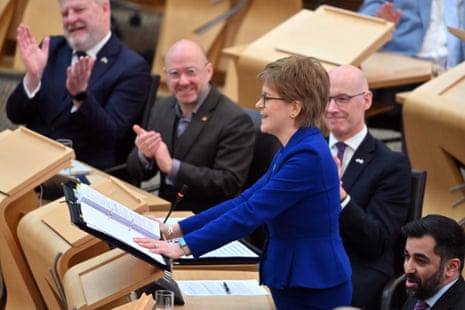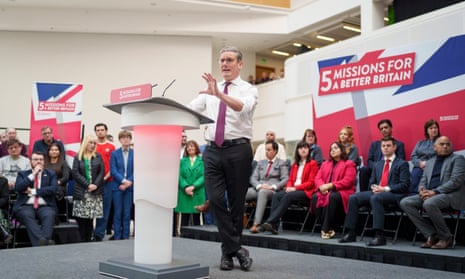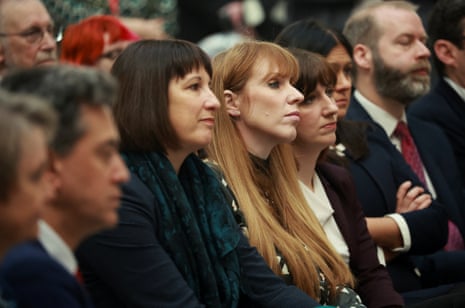Starmer responds to claim he has ditched leadership pledges by saying ‘vast majority’ of Labour members back him ‘100%’
Chris Mason from the BBC goes next.
Q: What is your policy on the corporation tax increase? And why should people trust you when you have abandoned previous pledges?
Starmer says Labour has not opposed the decision to put up corporation tax in the budget.
But, speaking to businesses, they do not cite this as a reason for not investing in Britain, he says.
On this pledges, Starmer says when he stood for the leadership, he said none of what he promised would happen if Labour did not win. He goes on:
The vast majority of Labour members and supporters are 100% behind what we’re doing. They really liked these missions, and they want us to put them into action, and to do what I promised when I stood as leader, which is to take our party from the worst general election defeat since 1935 to a Labour victory to a Labour government.
Key events

Here is the five-page document published by Labour this morning explaining its new commitment to “mission-driven government”. This is the one that Amol Rajan complained about on the Today programme this morning, saying “Hemingway, it ain’t”. He complained in particular about the passage promising “new structures and ways of working to facilitate collaboration, including replacing some of the cabinet committees with new delivery focused cross-cutting mission boards”.
Keir Starmer told him that what mattered was not the language, but the ideas, and that different parts of government had to work together to solve problems.
Lawyers advising Tory Eurosceptics submit fresh post-Brexit plan to Sunak
Lawyers advising Eurosceptics in the Conservative party have submitted fresh proposals to Rishi Sunak to end the rule of EU law in Northern Ireland, one of the major sticking points in the UK-EU negotiations over the protocol, my colleague Lisa O’Carroll reports.
NHS should consider charging people for missed appointment, says Matt Hancock
Matt Hancock, the former health secretary, has said the NHS should consider charging people who miss appointments.
Speaking during a general debate on the future of the NHS, Hancock said Rishi Sunak was right to float the idea of charging for missed GP appointments during the Tory leadership contest in the summer. He told MPs:
I thought that the prime minister was right to float in the summer the idea that if you miss too many appointments without a good reason then you should be charged for them.
One of the other problems of efficiency is that many, many appointments are missed, and this wastes the time of clinicians too.
I think it was right to float it, it’s right to consider it, but I would be totally against having to pay for the very first.
Hancock says charging people who abused the system would not undermine the principle of the NHS being free at the point of delivery. He said:
Of course people miss appointments for good reasons, but often, too often, don’t have a reason, and we should be thoughtful about how we address that.
Labour’s Margaret Greenwood told Hancock she completely disagreed with the idea, which might discriminate against the 7 million adults in the country who are functionally illiterate. “It would be much better to put resources into understanding why people don’t come to appointments,” she said.
In the summer Sunak proposed charging patients £10 for second and subsequent missed GP appointments. For the first missed appointment, they would receive the benefit of the doubt.
But after Sunak became PM Downing Street said he would not be implementing the idea because “now is not the right time to take this policy forward”.
SNP’s Kate Forbes issues apology in bid to reset leadership campaign
Kate Forbes has apologised for hurt caused and promised to protect the rights of everybody in Scotland, “particularly minorities”, as she endeavours to reset her campaign for the leadership of the SNP, my colleague Libby Brooks reports.
Ambulance handover delays outside hospitals in England have jumped to their highest level since early January in a sign the NHS is still struggling with winter pressures, PA Media reports. PA says:
One in four (25%) ambulance patients waited at least 30 minutes last week to be transferred to A&E teams, up from one in five (20%) the previous week.
It is the highest percentage since the first week of January, when the figure stood at just over a third of patients (36%).
Ben Wallace slaps down veterans minister Johnny Mercer over MoD budget comments
In an interview with LBC yesterday Johnny Mercer, the veterans’ minister, implied that Ben Wallace, the defence secretary, was overstating the funding problems he faces at the Ministry of Defence. Asked about recent comments by Wallace complaining about the MoD being “hollowed out and underfunded”, Mercer said:
He’s advocating for his department, when a spend is coming up.
But this prime minister, this chancellor, only 18 months ago gave the biggest defence settlement to defence since the end of the cold war. So it’s then not credible to go forward and say that we haven’t put money into defence.
This morning, Wallace was on LBC himself, and he retaliated. Asked about what Mercer said, Wallace replied:
Johnny is a junior minister. And Johnny luckily doesn’t have to run the budget.
Asked if he thought Mercer was being naive, Wallace went on:
No. I just think his experience is … he’s not the secretary of state. He hasn’t run … I run a department of 224,000 people, I think it is, or something like that … He’s got 12 people in the office.
In the past, veterans’ ministers have been based in the MoD. But Mercer is based in the Cabinet Office which, given relations with Wallace, is probably just as well.

Labour says asylum backlog figures show ‘shameful levels of incompetence’ from government
Yvette Cooper, the shadow home secretary, said the asylum figures out today (see 1.51pm) showed “shameful levels of incompetence” from the government. She said:
Despite all Rishi Sunak’s grand promises, fewer than 1% of last year’s small boat cases have been decided. These are truly shameful levels of incompetence from a government that has completely lost any grip.
After 13 years of failure, today’s figures underline the shocking mess the Conservatives have made of the asylum system. The Home Office is still taking a third fewer decisions each year than it was seven years ago and they have let the backlog rise by another 60% to a record-breaking high of 160,000, with the taxpayer fronting the cost through spending on hotels.
Cooper said Labour has a five-point plan to tackle the problem: “1) Crack down on the criminal gangs through the [National Crime Agency] and in partnership with France, Belgium and Europol; 2) Speed up asylum decisions; 3) Reform resettlement schemes to better target those most at risk of exploitation by trafficking and smuggler gangs; 4) Replace the Dublin agreement; and 5) Work internationally to address crises leading people to flee their homes.”

Photograph: Peter Byrne/PA
Asylum applications in 2022 at highest level since 2003, Home Office figures show
The Home Office has published asylum and immigration figures for 2022. PA Media has filed on the highlights.
-
A total of 160,919 people were waiting for an initial decision on an asylum application in the UK at the end of December 2022, up 60% from 100,564 at the end of December 2021 and the highest figure since current records began in 2010, PA says. (See 10.07am.) The Home Office said this was “due to more cases entering the asylum system than receiving initial decisions”.
-
The number of people waiting more than six months for an initial decision stood at 109,641 at the end of 2022, up 77% year-on-year from 61,864, PA says.
-
More than three-quarters (76%) of initial decisions on asylum applications in 2022 were grants of refugee status, humanitarian protection or alternative forms of leave, PA reports. PA says:
This is a “substantially higher grant rate” than in pre-pandemic years, when around a third of initial decisions were grants, the Home Office said.
The grant rate in 2022 is the highest since 1990, when it stood at 82% – although the volume of applications was much lower at that time, with 4,025 initial decisions made in 1990 compared with 18,699 in 2022.
-
There were 74,751 asylum applications in the UK in 2022, relating to 89,398 people, PA reports. PA says:
This is the highest total for any 12-month period since the year to March 2003, when it stood at 80,736 applications relating to 99,338 people.
-
Albania was the most common nationality applying for asylum in the UK in 2022, with 14,223 applications by Albanian nationals, 9,573 of which came from arrivals on boats crossing the Channel, PA reports. PA says:
The majority of Albanian applicants in 2022 (83%) were adult males.
Afghans were the second most common nationality applying for asylum last year, with 10,011 applications, more than six times the number in the pre-pandemic year of 2019 (1,573).
The Home Office said this rise was “likely due to the ongoing conflict in Afghanistan”.
Overall, just under half (45%) of total asylum applications in the UK last year were from people who arrived on a small boat.
-
Nearly one-and-a-half million visas were issued in 2022 to people coming to the UK for work, study or family reasons, or through one of the government’s settlement schemes, PA reports. PA says:
Some 423,013 work visas were granted, along with 626,551 study visas and 48,107 family visas, plus 5,055 visas for dependants joining or accompanying others, according to Home Office figures.
In addition, 210,906 were issued under the Ukraine visa schemes, 53,836 were granted to British national (overseas) status holders from Hong Kong, 34,338 were under the EU settlement scheme, and 3,903 were under other settlement schemes.
The combined total of 1,405,709 visas in 2022 is up 64% from 858,869 in 2021 and is the sixth successive record high for a 12-month period since current figures began in 2005.
UK salad shortages could last a month, warns environment secretary
Shortages of salad and other vegetables in UK supermarkets could last up to a month, Thérèse Coffey, the environment secretary, has told MPs. My colleagues Sarah Butler and Helena Horton have the story here.
DfE figures show NEU strike on 1 February had bigger impact than assumed, with only 24% of pupils in secondary school

Richard Adams
The teachers’ strike by National Education Union members at the start of this month had a greater impact than first realised, with fewer than one in four secondary pupils attending school in England, according to new figures published by the Department for Education.
The DfE’s data for 1 February – the day of the industrial action – showed just 24% of pupils attended England’s state secondary schools. In contrast, the DfE estimated on the day of the strike that only 9% of secondary schools were closed, while 87% were fully or partially open.
The national attendance figures had just 43% of pupils in state schools on 1 February, including 58% of primary pupils. The industrial action wasn’t joined by the NASUWT, the other major teaching union, or the two school leaders’ unions. The data includes pupils who were absent because of illness or other reasons.
The figures come as the DfE and the NEU are in a stand-off over pay negotiations, with the DfE demanding that the NEU cancel its regional strikes planned for next week before it holds formal talks. But the NEU says it will only call off the strikes if the government makes a “substantive proposal” before the weekend.
The NEU has scheduled a series of one-day school strikes starting on 28 February in north and north-west England, Yorkshire and Humber, followed by 1 March in the Midlands and the NEU’s eastern region, and 2 March involving London, south-east and south-west England. It also plans for national strikes on 15 and 16 March.
Here is my colleague Pippa Crerar’s report on the Keir Starmer speech.
Momentum dismisses Starmer’s missions as as ‘reheated Third Way Blairism’
Momentum, the Labour group set up to promote Jeremy Corbyn’s policies, has described Keir Starmer’s missions for Labour as “reheated Third Way Blairism”. A Momentum spokesperson said:
Just three years ago, Keir Starmer made a series of cast-iron pledges to Labour members and trade unions: for public ownership, wealth taxes and investment in a Green New Deal.
Given the scale of the crises and inequality facing Britain, these policies are more vital and popular now than ever.
Yet today, his promises lie in tatters, ditched in favour of the reheated Third Way Blairism typified by these latest, vapid ‘missions’.
To avoid charges of serial dishonesty and ensure a Labour government actually faces up to the scale of the wreckage it will inherit from the Tories, Starmer should change course, listen to party conference and lay out a bold vision of a transformed country which delivers for the many, not the few.
In response to Starmer’s claim that the “vast majority” of Labour members supported him (see 11.12am), a Momentum spokesperson said a poll last year showed that Labour members overwhelmingly backed the renationisation of rail, the Royal Mail, energy and water companies. Labour has said it would take rail companies back into public ownership, but other renationalisations have been dismissed as too costly.
Starmer’s speech and Q&A – snap verdict
That was one of Keir Starmer’s most impressive speeches as Labour leader – not so much because of the content, but because of the confidence with which he delivered it. Starmer has often been dismissed as boring but, despite delivering a speech on “mission-driven government”, he wasn’t boring today. He looked and sounded inspiring, and prime ministerial. It is remarkable what a 20-plus point lead in the polls can do for a leader.
Starmer announced five missions for a Labour government (see 10.35am) and what he claimed was a new approach to delivering them (see 8.55am). The missions are sensible and, where they do come with dates that turn them into targets (on growth and clean energy) genuinely ambitious. But they are less specific and memorable than the Labour promises from 1997 (probably the most successful example of an election pledge card in recent British politics). With the exception of the zero-carbon electricity one, they are all things that can or will be promised by the Conservatives too. They are certainly not socialist, and there is nothing even leftwing about them. Starmer did not mention redistribution, and what he did say about making Britain fairer – breaking down barriers to opportunity, boosting jobs in every region – sounded like a watered down version of Tory levelling up.
Starmer set out in detail why he believed in a new, “mission-driven” approach to government, but it all sounded very familiar. Most prime ministers in recent times have been in favour of focusing on the long term, not the short term, tackling social problems at their root, getting government departments to work together, and partnership with the private sector. All of this was sound, and none of it was obviously wrong. But Rishi Sunak would have agreed with almost every word.
But what made Starmer’s performance so strong was what he was able to say about Sunak, and the Tories. Starmer was right to say Sunak’s pledges are short-term fixes, because they were announced as a measure to rescue a government whose reputation was completely trashed by Liz Truss. And Sunak can’t make promises without people remembering his party’s fairly dismal 13-year record in power. Starmer is free of all that.
The real measure of Starmer’s strength is how difficult the Tories are finding it to attack him. Today, rather than criticise anything Starmer actually said or promised, they resorted to attacking a completely different Labour leader – what they want him to be, rather than what he actually is. (See 11.59am.)
All they’ve really got on him is inconsistency, and flip-flopping. This works up to a point, and if politicians U-turn too often, they forfeit trust. But voters accepts that politicians can change their minds (all of us do), and U-turning to a position where you are aligned with the public is always more acceptable than going the other way. Starmer was asked repeatedly today about breaking some of the promises he made during the Labour leadership contest (see 10.24am and 11.12am) but he coasted through these questions quite comfortably.

Tory chairman Greg Hands claims Starmer has ‘never made pledge he intends to keep’
Greg Hands, the Conservative party chairman, has put out this statement in response to Keir Starmer’s speech. Hands said:
Starmer has never made a pledge he intends to keep.
He will say anything if the politics suit him. He lacks principles and has no new ideas – and that is how we know a Starmer Labour government would just revert to the same old Labour habits of spending too much, raising taxes, increasing debt and soft sentences.
Only the Conservatives will get on with delivering for the British people. Halving inflation. Growing the economy. Reducing Debt. Cutting waiting lists. Stopping the boats.
The Tories have also been attacking the speech through their Twitter account – although perhaps this tweet needs a rethink. The Tories inadvertently seem to be arguing that Starmer would control immigration, control spending, cut debt and impose tougher sentences – all policies they favour.
Robert Peston, ITV’s political editor and a former BBC business editor, thinks Keir Starmer will struggle to achieve the growth mission he unveiled today. (See 8.40am.)
.@amolrajan revealed that one of Starmer’s five missions is to deliver “the highest sustained growth in the G7”. That is an ambitious target, to put it mildly. If achieved it would mean the sustainable rate of growth in our prosperity would exceed the US and Germany, both…
— Robert Peston (@Peston) February 23, 2023
of which currently have significant structural advantages over the UK. Most would argue it is important for any government to aim high. It is a great way to focus minds. But given we start from a position where spare capacity in the UK is minimal even when…
— Robert Peston (@Peston) February 23, 2023
the economy is more-or-less stagnating, leapfrogging America and Germany will neither be speedy or easy. For the hope that Starmer says he will restore not to be the short-cut to despair, he needs to unveil practical building blocks. We’ll see what he says later today
— Robert Peston (@Peston) February 23, 2023
To be clear, Starmer says a Labour government would transform the UK so that it would deliver a faster sustainable rate of growth in GDP than America and Germany. This was true for about ten years vis à vis German from mid 90s, but otherwise that has never happened since WW2… https://t.co/jR1fzAqTHq
— Robert Peston (@Peston) February 23, 2023
Q: Do you need two terms to achieve these missions? Or can they be done in one parliament?
Starmer says “some of these issues are not going to be fixed within five years”. They will take longer.
But the missions come with steps to be achieved along the way.
And that’s it. The Q&A is over.

Stay connected with us on social media platform for instant update click here to join our Twitter, & Facebook
We are now on Telegram. Click here to join our channel (@TechiUpdate) and stay updated with the latest Technology headlines.
For all the latest Education News Click Here
